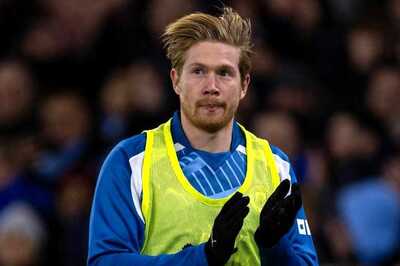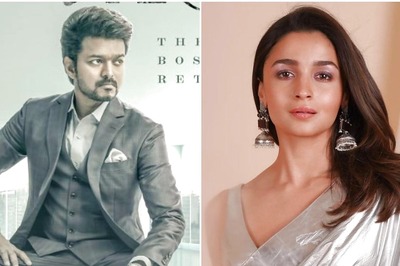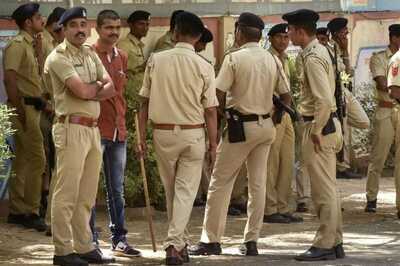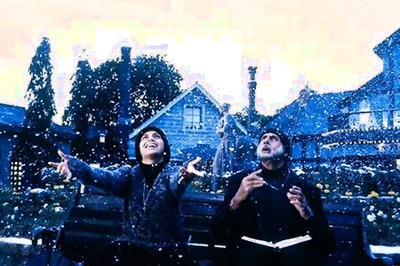
views
Dry-Cutting Curly Bangs

Don’t wet or straighten your hair. Because curls are longer when they’re wet or straightened, it’s best to cut your curls when they’re dry and natural. Wetting or straightening them before you cut can cause you to end up with extremely short, uneven bangs. Dry-cutting is currently the most popular method for cutting curly hair, because there is no surprise when the hair shrinks and pops up after it’s dried. Use the normal types of products in your hair that you normally use prior to starting your cut, so that your hair looks just like how you usually wear it.

Section out new bangs from the crown of your head. If you don’t already have bangs, you’ll have to section out the hair that you want to cut into bangs. A popular method is to choose a center point close to the crown of your head, and make a triangle shape by drawing a line with a wide-tooth comb on either side down to each temple. As you make each line from the center point to your temple, comb the hair forward to help separate it out from the rest of your hair. Use the outer tips of your eyebrows as a guides to determine the width of your bangs. Keep in mind your hair’s thickness when deciding how far back to start your triangle; very thick bangs will make the back of your hair look smaller in volume than it normally does.

Pull the rest of your hair back. Take the rest of your hair that will not be bangs and clip it with a large clip or elastic hairband. This keeps it out of your way while you’re focusing on your bangs.

Separate 1 center curl between your fingers, and snip 1 loop from the bottom. With your fingers, take 1 center curl strand from your bangs and separate it from the rest. Hold it between 2 fingers of your less-dominant hand, and with your dominant hand, hold the scissors with the sharp end facing up and snip the bottom loop of your curl from that strand. Don’t stretch your curl out as you cut it; remember, keep it natural so you know exactly how much you’re trimming. Continue snipping loops on that curl from the bottom, until the curl is a bit longer than you want it. Most people aim for eye-length, or so the end falls right in front of your eyes. You can make it shorter later.

Separate another center curl and snip 1-2 loops from the bottom. Take another curl strand and hold it between 2 fingers. Use your scissors to snip however many loops from the bottom as you like in the same diagonal fashion that you did with the first curl. Trim this curl about the same length as you did the first curl. It doesn’t have to be exact, since the nice thing about curly bangs is they can look uneven as long as they’re close to being the same length. Hold your first curl next to the curl you're currently working on and use it as a guide to keep things even.

Trim all curls about the same length for straight-across bangs. If you’re going for bangs that are the same length straight across, cut each curl in your bang group of hair so it looks about even with the first curl that you cut.

Leave side curls 1–2 in (2.5–5.1 cm) longer for angled bangs. If you’d rather have angled bangs, or bangs that are longer on one or both sides, cut the center curls so they’re about eye-length and then cut less loops from the bottom as you go out toward your eyes and temples. For bangs that are longer on just 1 side, trim the center and side you’re not angling about the same length, then cut less loops from the bottom as you go out toward the long side. The 1–2 in (2.5–5.1 cm) length difference is a suggestion; you can cut the sides of your bangs at any length that you prefer.

Cut each curl individually depending on how much needs cut. Not all of your curls will need the same number of loops cut from the bottom; it all depends on how long each curl was to begin with. Treat each curl as an individual strand that contributes toward your hair as a whole. Never gather a huge group of curls into your hand and attempt to cut them all at once with 1 quick cut. Doing this will leave your hair very uneven and possibly shorter than you wanted it. This method will lead to layered bangs, and so shouldn't be used around the bang area.

Shorten each curl as desired. Now that you’ve shaped your bangs into a straight-across or angled look, trim just the bottom loops or half-loops to get them right above your eyes at the center. You want to be able to see well with your bangs, but not cut them so short that you dislike them. If you’d like to make layers in the front of your hair beyond your bangs, simply unclip the rest of your hair when you’re finished with your bangs and trim a few loops from the bottoms of side curls in the front of your hair.
Choosing a Curly Cut

Choose eyebrow-length bangs to draw attention to your eyes. People with curly hair may wonder if they can wear bangs; the answer is of course! Straight-across, squared-off bangs cut right below the eyebrows look great on many thicknesses of curls; and this is a great way to show off your beautiful eyes. If you have dense, coarse curls, combine this style of square bang with a natural shoulder-length for a look that really stands out. Medium curls or waves can wear this type of bang with any length cut ranging from a bob to waist-length.

Try a side-bang oval layered cut for dense, coarse curls. This type of haircut for dense and coarse curls is past your shoulders at the bottom, with layers going up to create volume on top. With a side part and angled bangs, the finished shape is that of a perfect oval. This look highlights the cheekbones of oval-shaped faces. To get this cut, ask for an oval-shaped cut that’s past your shoulders on the bottom and shorter and rounder on top, with side angled bangs.

Angle hair around your face to show off long curls. Whether you have loose or tight curls, you can show them off by skipping bangs altogether and layering some curls in an angle near your face and on your top layer. These angled layers will prevent your face from becoming overshadowed by your long curls as well as prevent too much frizz from forming at your ends. Do this cut by holding 1 dry curl at a time from the front of your hair between your fingers, and snipping 2-3 loops from the bottom with the scissors held diagonally facing upward. Continue snipping loops from the bottom until the curl is the length that you want it. Repeat snipping curls 1 at a time with other curls along your face and on top of your head.

Choose an upside-down triangle cut for lots of tight curly hair. This cut has the bottom layers as chin-length while the middle and top layers gradually become shorter, achieving an upside-down triangle shape. The top is big and poofy, with bangs slightly shorter in the center that delicately frame the face. After you cut your bangs, shape your upside-down triangle by leaving your bottom layer of hair chin-length. Section off a middle layer by clipping the top of your hair up and out of the way. Snip dry curls on the sides 1 at a time so that they gradually become shorter as you go up the side. Unclip your top layer and snip those curls so that they are 1 or 2 loops shorter than the ones in your middle layer. Have a friend or stylist do the back of this cut, since it will be difficult to snip curls yourself while looking in mirrors to see the back.

Try a jaw-length bob for fine-textured wavy curls. If your curly hair is more wavy than tight, and has a fine texture, you can pull off a strong bob by taking shears to it below chin-length while it’s damp. When your hair is fully dried and styled, your curls will shorten to your jaw for a look that’s simple but bold. Wet your hair and comb it out with a wide-tooth comb. Cut a straight, chin-length line all the way around your hair. Wait for your hair to dry and add a curl enhancing product for a finished look. Have a friend or stylist do the back of this cut, since it will be hard to manage the shears yourself while using 2 mirrors to see the back.



















Comments
0 comment